Texas gov transforms immigration from a border issue to a backyard one. Dems aren't happy.
DENVER – When elementary school teacher Kristine Wussow began hearing about migrants being bused to her city by Texas with no support, she rushed to collect donations.
On a recent day in January, Wussow, 50, and other volunteers handed out clothing, cookies and homemade baked ziti to Venezuelan migrants staying at a hotel-turned-shelter on the city’s east side.
Her heart broke, she said, seeing families living in tents in the cold. But she also worried whether the local generosity would dry up.
“When I reached out to my neighborhood, people poured out help. But if these folks were living in our actual neighborhood? I can see how that would be different," she said. "One woman who lives here in this neighborhood, she told us her neighbors are angry. They don’t want to help."
While Republicans, including former President Donald Trump, promote hard-line border policies in stump speeches and news conferences, Texas Gov. Greg Abbott has effectively exported the border – and all the problems that come with it – to America's backyards.
Americans who once watched humanitarian crises with pity or disdain from afar now are seeing it close up.
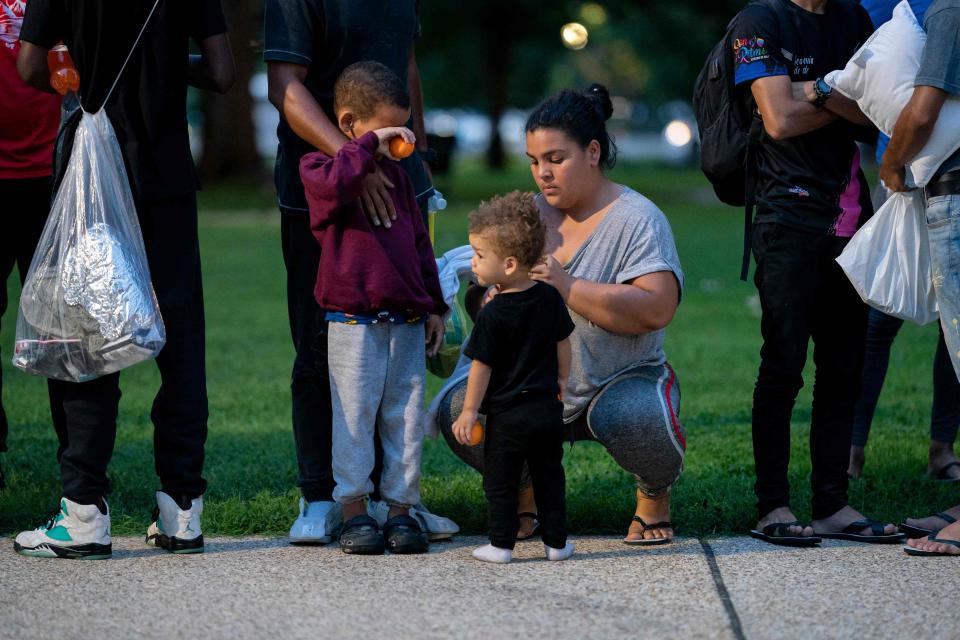
More than half of Americans in a recent USA TODAY/Suffolk Poll this month said they support the idea of sending troops to the southern border and ordering the mass deportation of illegal immigrants. Only 43% said they opposed both, and 4% were undecided.
Abbott's controversial migrant busing program crossed a threshold this month: Operation Lone Star has bused more than 100,000 migrants from the Texas border to Washington, New York, Chicago, Denver, Philadelphia and Los Angeles.
Democratic leaders of the cities Abbott has targeted are pushing back against what they say are his “cruel” tactics. But they’re also complaining about too many immigrants arriving in their communities.
Last Sunday, Illinois Gov. JB Prizker took out a full-page ad in the Austin-American Statesman pleading for Abbott to temporarily halt the migrant busing, noting the cold weather blanketing the nation.
"This is not sustainable," Denver Mayor Mike Johnston said a few days earlier, noting that his city was now spending 10% of its annual budget on emergency housing and other migrant services.
"Gov. Abbott has made it clear he wants to destabilize cities, sending thousands of migrants and asylum seekers here," said New York City Mayor Eric Adams, who recently sued the bus companies that have been delivering migrants to his city's doorstep.
Meanwhile, the buses have kept coming.
"You can applaud Abbott for having won the narrative war," said Muzaffar Chishti, senior fellow at the nonpartisan Migration Policy Institute. "He opened these salvos and he has had the last word. But he doesn’t deserve a standing ovation. He is doing it for politics."
Border problems in Texas
Abbott contends Texas is engaging in a "historic border security effort" and shouldn't bear the full cost of assisting migrants, even as the state spends millions of dollars on the busing program. His press office didn’t respond to an emailed request for comment.
To make his point, he has pushed the bar for hard-line tactics at the border to extremes and has made Texas the go-to state for Republicans hoping to burnish their border security credentials in an election year. Abbott recently told a conservative talk radio host that Texas is "using every tool" from building border barriers to enacting a state law making it a crime to cross the Texas-Mexico border illegally.
"The only thing that we're not doing is we're not shooting people who come across the border, because, of course, the Biden administration would charge us with murder," Abbott told the host. The three-term Republican governor later said no one should misconstrue his remarks to mean that migrants trying to cross the Rio Grande should be shot.
Read more Mexican family's death at border looms over ongoing Justice Department standoff with Texas
This month, House Speaker Mike Johnson, R-La., held a news conference in Eagle Pass, Texas, flanked by more than 60 Republican members of Congress.
Out-of-state sheriffs have been loaning their deputies to patrol Texas border counties. The governors of at least 14 states – including those crucial to the 2024 presidential election such as Florida, Iowa, Ohio and South Carolina – have sent Texas their personnel and resources or deployed their own National Guard troops to Texas.
Federal and Texas officials are locked in a legal dispute about who has jurisdiction over border territories and how much leeway the state has to deter migrants. The federal government went to court last summer to stop the state from placing buoys in the Rio Grande, and the two have been legally sparring ever since.
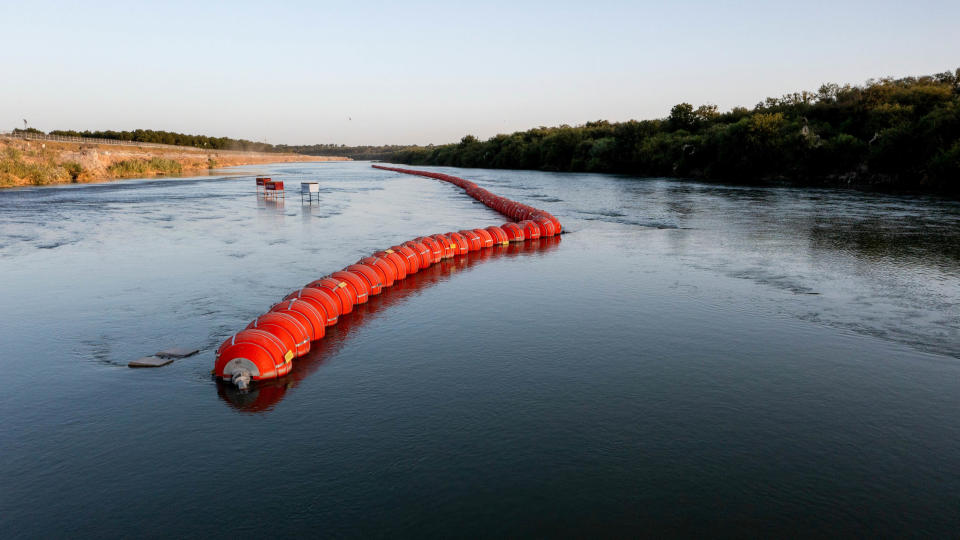
In the latest disagreement, federal officials accused the state of blocking its access to a park where it had set up a staging area to search for migrants, which contributed to the deaths this month of a woman and two children who drowned while trying to cross the river.
Delivering busloads of migrants without a heads-up
Domingo Garcia was in Washington, D.C., for a meeting in September 2022 when he got a call that two buses chartered by Texas had left dozens of migrants near the home of Vice President Kamala Harris.
He and his staff at the League of United Latin American Citizens, the nation's oldest and largest Latino civil rights organization, rushed to the neighborhood to find more than 100 men, women and children huddled on the sidewalk, disoriented. They had no food, no money.
“It was such a cruel political act," said Garcia, president of the organization. At the time, Abbott said he deliberately orchestrated the drop-off to provoke a response from the administration and pledged to continue sending buses "until President Biden and Border Czar Harris step up and do their jobs to secure the border."

Texas border communities were then struggling to shelter thousands of Venezuelan migrants who ? unlike many other migrant groups with ties to friends and family ? were arriving without resources or a sponsor in the U.S.
Border nonprofits have traditionally helped move migrants to cities across the U.S. by organizing directly with churches and shelters – without creating humanitarian disasters.
But the governor’s decision early on to deliver buses to the Fox News headquarters in New York and to the Harris residence in Washington drew criticism for political grandstanding, as did his unwillingness to give a heads-up about the arrivals to the mayors of the Democrat-led cities he targeted.
In Denver, where officials say they've received 2? times the number of migrants per capita overall than any other receiving city, the mayor projects spending 10% of the entire annual budget aiding migrants this year.
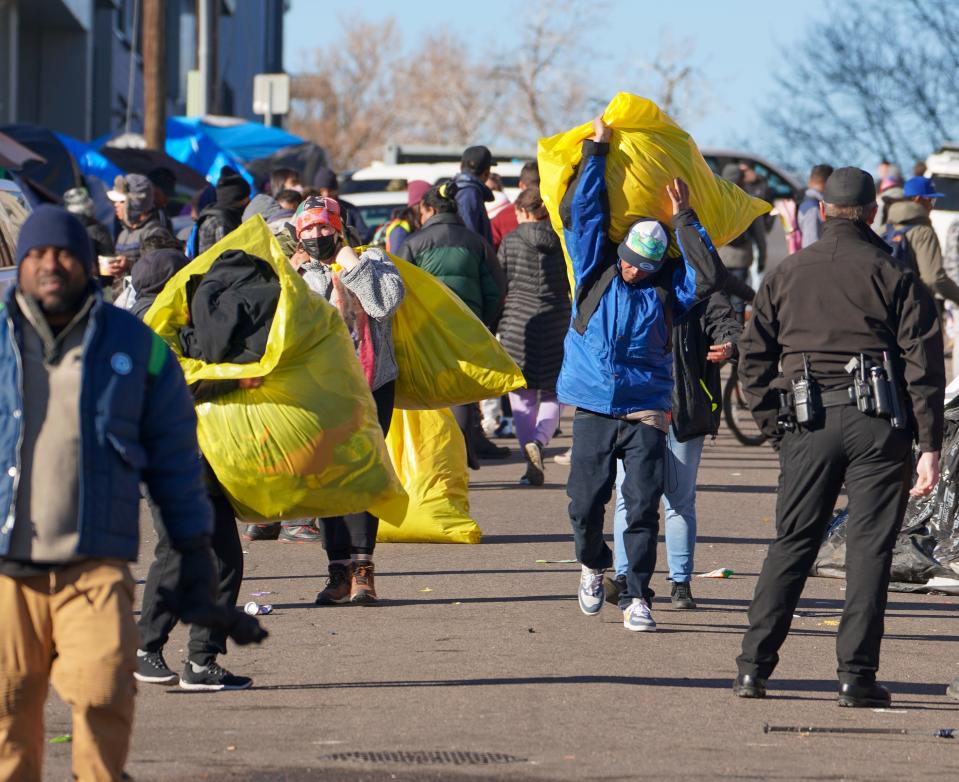
About 36,000 migrants have arrived in Denver over the past year; Abbott's Operation Lone Star transported about 15,700 of them, according to Texas data.
Juan Carlo Pioltelli, 32, arrived from El Paso, Texas, in December with his partner and their daughter and lived in an illegal encampment for a week.
“When you come here, you want the American dream,” said Pioltelli, a Peruvian migrant who said he was uncertain who paid for their 600-mile bus trip.“The guards in Texas told me that you can go to Denver and it would be good, but when we got here it was different,” he said, shivering in the below-freezing air. “All these people, all we want is to work.”
In order to work, though, the migrants must receive federal permits.
Pioltelli and his family came without work permission or the contacts other more established immigrant groups have historically relied on to get jobs.
Denver city officials earlier this month evicted about 300 migrants living in an unsanctioned tent city near downtown. But on the same day they relocated those migrants to more adequate shelter, another 300 arrived on buses from the border.

"If they arrive and are here for three months or six months or two years and can never work, we're going to need endless amounts of federal support for those individuals," Johnston said. And not only do they not want that, we don't want that. They just want to support themselves."
Federal officials have been trying to speed the process of granting work authorization to migrants, who sometimes have to wait up to five years for a hearing to determine whether they can remain in the United States. Late last year, the U.S. Citizenship and Immigration Services reported it had granted about 5,000 temporary work authorizations in about four months.
Lacking money and resources, many of the migrants have been living in illegal, unsanitary tent cities like the one Pioltelli lived in for a week.
Johnston called for the nation's 100 largest cities to develop a system to accept, process and assist migrants similar to the comprehensive federal system used for refugees from Syria and Somalia.
Taking their disputes to court
New York City has had the most enduring public fight with Abbott over the state's migrant busing operation.
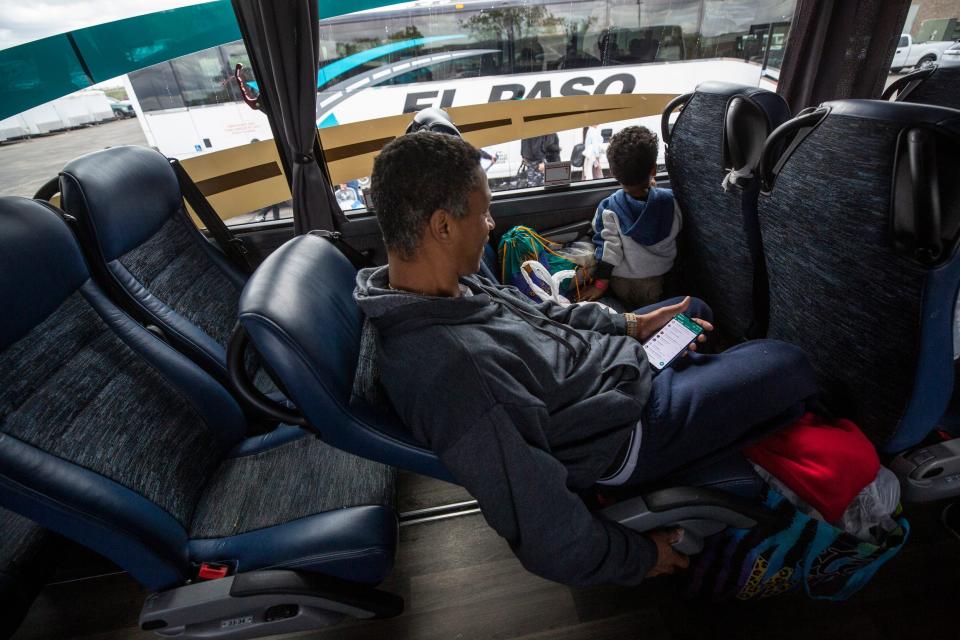
With the densest population in the U.S. and overseeing the largest number of migrants bused by Texas, Manhattan Borough President Mark Levine said he’s proud that New Yorkers have done their best to provide for migrants despite receiving little support from the federal government.
But, Levine, a Democrat, said New York has placed more than 68,000 in some sort of shelter, including 20,000 Manhattan hotel rooms.
“You know the saying, ‘As New York goes, so goes the country,'” Levine said. “But we are fending for ourselves as more migrants are arriving and staying in shelters than leaving. This is going to weigh heavily on voters' minds.”
Democrats try to reshape the political narrative
Rafael Collazo, executive director of the UnidosUS Action Fund, a Latino advocacy group, said Democrats need to counter narratives that immigrants are a cause of the nation’s economic and cultural problems.
“It only becomes a winning issue for a right-wing agenda if we allow that and their rhetoric goes unchecked,” Collazo said.
He said Democrats and advocates aren’t pushing aggressively enough to accuse Abbott of using people as political pawns.
“Some of the shenanigans are working for them in the moment as it relates to dealing with their real hardcore MAGA base,’’ Collazo said. “But it's still a very open question if it'll work for them in a general election.”
Meanwhile, Collazo said, local organizations providing support to migrants are frustrated because they don’t have enough resources.
“This is work that they’re built to do," he said, but they are feeling the same strain as local governments.
Collazo said it’s incumbent upon Democrats “to have the courage to be honest with the American people and say the source of your economic stress is not undocumented refugees that are seeking asylum.’’
The country's population would shrink in 2024 if it weren't for immigration, according to the Census Bureau. Economists say population growth is essential to grow the economy and shore up a labor market that has nearly 9 million reported job openings, according to the Bureau of Labor Statistics.
Many immigrants rights were established during the civil rights era, when leaders tried to establish a more fair and less racist immigration system, said U.S. Rep. Greg Casar, a Democrat from Texas. Those need to be improved now, but the country shouldn't go back to the days of scapegoating immigrants, he said.
“It's the oldest trick in the book to essentially blame our problems on the poor or the sick or those folks that are fleeing violence or those people that don't have a right to vote,’’ Casar said.
Casar said Abbott's approach, which he compared to that of George Wallace, a former Alabama governor and 1960s segregationist, could spark a backlash in an increasingly diverse Texas.
"I think by trying to play to his mostly anti-immigrant base, I think Greg Abbott will still continue to accelerate political problems for himself.’’
People as political pawns?
Two years after the dropoff "stunt" at the Harris residence in Washington, Garcia, from the League of United Latin American Citizens, said Abbott's tactics still stand out.
He said he hadn’t seen such ploys in his 50 years of civil rights work, particularly where a politician would “use refugees, Christians as political pi?atas to be bashed and used and thrown away like what we're seeing with this group of Republican leaders.”
“You would think that somebody at their church would tell them, ‘'This is not what Jesus would do,’" he said.
Garcia complained that both sides have fallen short on addressing the problem, saying Democrats need to establish a legalization process.
“The campaign team and the administration have kind of been asleep at the wheel as the humanitarian immigration crisis has continued to build over the course of the last year,’’ he said. “And unfortunately, the Republicans have turned a humanitarian crisis into an opportunity for fearmongering, scapegoating and creating a whole presidential campaign over the fear of the other.’’
Wussow, the Denver school teacher, said she worries the influx of migrants, and the challenges they're placing on local services, could harden the hearts of independent voters who now cannot avoid seeing the problem firsthand.
“I’m going to be optimistic and hope that people will see these are all humans with needs, and hope for the best."
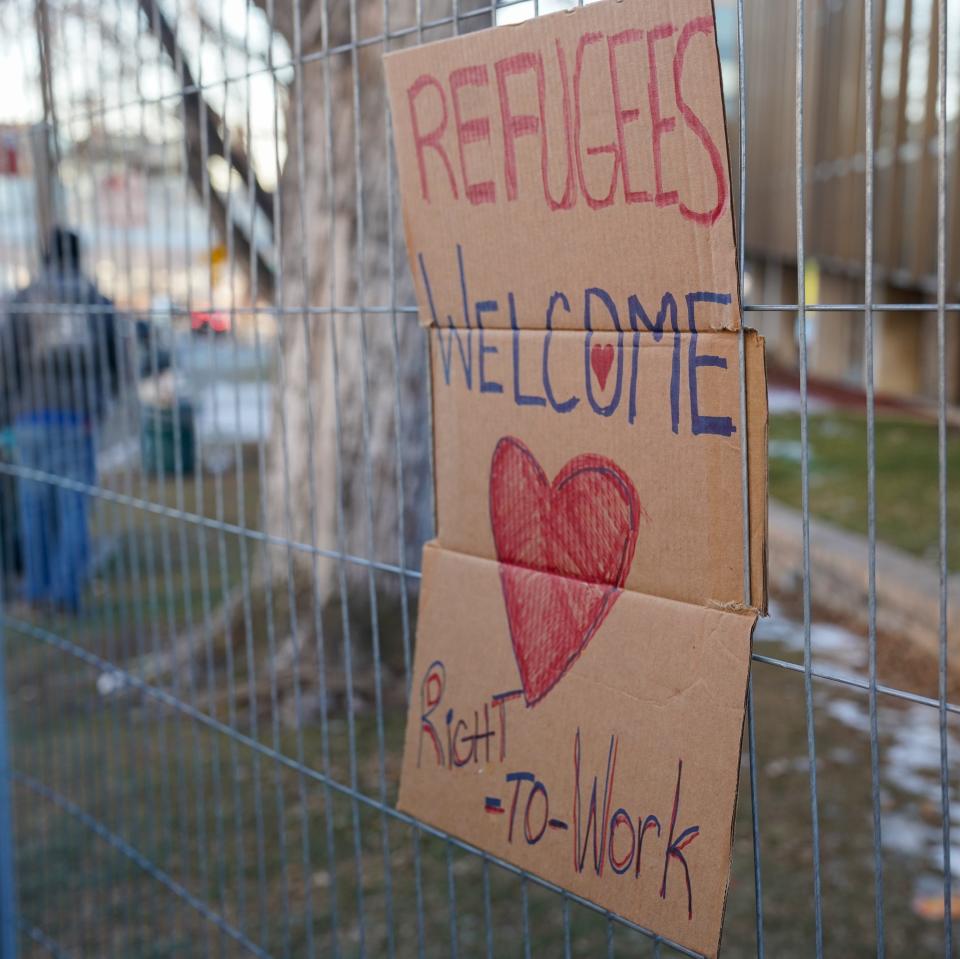
This article originally appeared on USA TODAY: Exporting the border: Texas Gov. Abbott reshapes immigration debate
